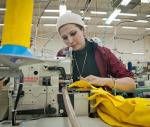You are here
How Jordan can reopen: Life after lockdown
Apr 02,2020 - Last updated at Apr 02,2020
Is the coronavirus changing life as we know it for the future, or is it a temporary inconvenience we need to merely push through for the time being?
Over the past few months, the United Kingdom’s initial strategy of attempting to naturally build herd immunity among the population sent many into an uproar. By definition, herd immunity is a type of immunity humans develop for protection from infectious diseases, which occurs when a large percentage of a population has become immune to an infection, whether through previous infections or vaccination. Thereby, this provides a measure of protection for individuals who are not immune. Currently, no vaccine or proven medicine for the coronavirus is in sight.
If the effects of COVID-19 were not so high, a strategy of building herd immunity would be logical. But we know better at this point. The coronavirus has an infectiousness measure (referred to as R0 in epidemiology) of approximately 2.5. This means that each sick person infects on average 2.5 others, compared to the flu that has an R0 of 1.5. Furthermore, another gauge of the virus is how often infected people must be hospitalized. The seasonal flu approximately causes 1% of its victims to be hospitalised. With COVID-19, that figure is ranging from 10 to 20%, although still not precisely clear. Over two months, a person with the flu can lead to the infection of 386 other people, of whom only a few need to be hospitalised. Within that same time period, a COVID-19 patient can lead to the infections of 99,000 people, of whom nearly 20,000 might need to be hospitalised.
These numbers are terrifying enough to exemplify that relying on building herd immunity is not sufficient, and an intervention must take place. Jordanians have been living under a nation-wide lockdown for almost two weeks now. This has been a very logical response given the characteristics of this novel virus. But we must understand that with the nature of this pandemic, surviving a nation-wide lockdown will win us the battle, but not the war. We may have controlled the initial breakout of a pandemic in our country. However, we must be very aware that we have not built any type of herd immunity. With no vaccine or medication in sight for the near future, this has profoundly dangerous limitations to our life after a lockdown.
The message should be clear: a nationwide lockdown would be only the first step in a long fight that will proceed at a different pace in different parts of our country. Jordanians should not celebrate with the end of lockdown. Rather, they should be prepared for the second stage of our battle with this pandemic; a stage that is primarily controlled by our individual behaviours and choices.
Community-level interventions and individual-level responsibilities
Unfortunately, the battle does not end anytime soon. Even if lockdown is lifted, public spaces and gathering should be limited. A lockdown cannot be removed suddenly, and life cannot return to normal within few days, or even weeks, as some people imagine. Rather, we should gradually return specific aspects of ‘normal’ life. Parks, malls, cinemas and sports events should continue to be closed. Domestic travel between cities should be closely monitored by officials.
With Ramadan approaching, we also have a responsibility to modify our individual-level behaviour. Social gatherings must be limited and domestic travels to perform social duties should be reconsidered. Without herd immunity or an available medication, it is extremely possible that we continue to remain at risk for the coronavirus.
Countries with low numbers of infections, like Jordan, are highly vulnerable and at-risk for further waves of the pandemic. With no herd immunity and no vaccine in sight, the lockdown has bought us time to reconsider how we need to navigate our lives with the presence of such virus in our world. Life needs to slow down for a time far beyond the removal of the lockdown. We need to be aware of our social interactions, domestic travel plans and individual-level behaviours. The success of our war with the coronavirus pandemic began with strict governmental policies, but the outcome will be defined by our respective behaviours.
It is time that we come to terms with the fact that this pandemic has changed our lives and will continue to do so for the near future. The lockdown is one of the very first steps of battling the coronavirus pandemic in Jordan. It may win us the battle, but not the war. Jordanians must keep fighting.
Yazan Ahmad Al-Ajlouni is a Public Health Researcher at The University of Cambridge in the UK and at Columbia University Mailman School of Public Health in New York City. He has over a dozen peer-reviewed publications in the field of public health, in addition to co-authoring four book chapters focusing on Neighborhood and Geo-Spatial Health. He contributed this article to The Jordan Times












